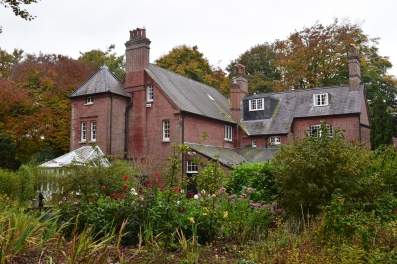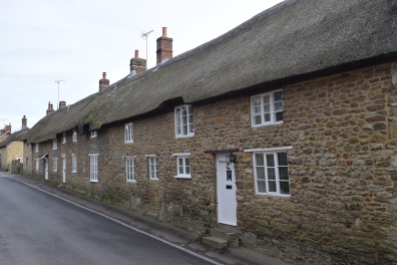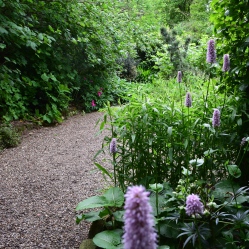 I recently discovered Dorset – not that I didn’t know it was there before, but more the fact that I never visit there as my obsession fort many years has been Cornwall. My grandparents used to go on holiday in Dorset every year and we have a wonderful collection of family holiday snaps taken in the 1930’s on Chesil Beach and in Lyme Regis.
I recently discovered Dorset – not that I didn’t know it was there before, but more the fact that I never visit there as my obsession fort many years has been Cornwall. My grandparents used to go on holiday in Dorset every year and we have a wonderful collection of family holiday snaps taken in the 1930’s on Chesil Beach and in Lyme Regis.
So last October, I decided that our half term trip would take us to explore Thomas Hardy country. We booked a few days at Toomer Farm near Sherborne. It is so difficult to find a place these days that wil accept a 3 year old, but this farm is a wonderful 16th century farm which operates not only as a working farm now, but also as a Bed and Breakfast and Equestrian centre as well and happily accepts toddlers. Rumour has it that Elizabeth I stayed there as she toured her Kingdom.
My plan was to visit as much of Thomas Hardy’s country as I could. My love of Hardy started when I was 14 and had to choose two books for my GCSE English coursework. My tutor suggested Tess of the D’Urbervilles and I was hooked. The vivid imagery of the people and the landscapes had me engrossed. She also introduced to me what has become my lifelong favourite poem – The Darkling Thrush. I remember visiting Hardy’s Birthplace not long after in the summer holidays with my mum, but I don’t think I’ve returned to Dorset since. I only wish I’d returned sooner.
Thomas Hardy was born on 2nd June 1840 in the village of Higher Brockhampton, just a couple of miles south of Dorchester. He was the eldest of a family of four children and they lived in an idyllic cottage up a small country lane. Even today, as you leave the visitor centre and make your way up the track, you could be forgiven for thinking you’d stepped back 150 years and were about to bump into the Hardy family any moment. Hardy’s Cottage is now owned by the National Trust. Surrounded by beautiful woodland, a cottage garden and miles of beautiful Dorset countryside it is not hard to see where Hardy got his inspiration from.

After attending the village school, he went as a day boy to a private school in Dorchester. In 1856, at the age of 16 he joined a local architect firm and for the next few years spent time on his favourite three interests – architecture, classics and his love of the Dorset countryside. In 1862 he went to London to further his architecture career and by this time he was already starting to write. But ill health in 1867 forced him to return to Dorchester where he continued to work as an architect. It was soon after that whilst working on a project in Boscastle that he met his future wife. It wasn’t until the early 1870’s that Hardy’s writing began to gather momentum – his first published novel entitled ‘Desperate Remedies’ was not an overall success but the following year, 1872, the publication ‘Under the Greenwood Tree’ was much better received and this start a lifelong literary career. Although he loved writing novels, it is said that his main love was poetry. The novels became a success financially allowing him the money to live a comfortable life and be able to write the poetry he craved. People bought into the world he created, and still remain popular today.

In 1874, Hardy married Miss Emma Lavia Gifford at St Peters Church in Paddington and for several years they moved from place to place around London. But in 1881 they returned to Dorset. At first they lived in Wimborne Minster but in 1883, Hardy purchased a plot of land about a mile south of Dorchester, on the Wareham Road and designed and built Max Gate, which was to be his home for the rest of his life. They still in kept in touch with London and frequently visited their friends and colleagues there. But Hardy loved the peace and tranquillity of Max Gate and it was here that he wrote many of his finest novels including The Mayor of Casterbridge published in 1886, The Woodlanders in 1887 and Tess of the D’Urbervilles in 1891. Max Gate is also owned and run by the National Trust.
Hardy was one of the founders of the Dorset County Museum and today the museum holds over 7000 items from his life, including a wonderful first edition of Far From The Madding Crowd. Hardy died on 11th January 1928. His ashes were taken to Westminster Abbey and his heart was buried in the churchyard at Stinsford, close to where his mother, father and other family members were buried.
While Hardy’s cottage fills you with memories of a simpler time when rural families lived in small cottages, the walls blackened with smoke, snakes slithering up to the back door (One was famously found in Hardy’s cot while he slept as a baby, by his mother), low ceilings and growing your own produce in your garden. Max Gate is a much grander affair, reflecting not only perhaps a successful career but also a change in life and the progression of the Victorian ideals. But Max Gate is a grand house on a small scale – as soon as you enter the hallway there is a cosiness and warmth about it. It feels as if Hardy has merely stepped outside his front door for a walk in the hills to ponder his latest poem.
As you enter the sitting room on the right, a warm fire crackled and spat, the wonderful smell of the burnt wood seeping through the air. When you walk into some homes, you are greeted with a coldness of a time so far removed from our own its hard to imagine anyone actually living there. But Max Gate is a home and I think always will be. This is how I want my sitting room to be, warm, cosy and always inviting to anyone who turns up for a chat. However, my favourite part of the house was Hardy’s study – I was quite overwhelmed to be stood by his desk, overlooking his beloved garden.
 I feel honoured to have the opportunity to stand, where Hardy would have stood as he wrote, contemplated, loved and laughed.
I feel honoured to have the opportunity to stand, where Hardy would have stood as he wrote, contemplated, loved and laughed.
I struggle to write living in London. It feels too enclosed and stifling – I need space, air and trees to really find my ideas. I think a little bit of me was jealous as I looked out of the window – what a wonderful place to be able to live and write. No wonder his works are so full of rich descriptions of the countryside that surrounded him. How could they not be?
Hardy set all of his major novels in the fictional county of Wessex which he had created. The places in his novels all exist but with fictional names. At the start of his writing career to he chose to stick to the places he knew well – the area he grew up in. Dorchester became Casterbridge and Brockhampton became Mellstock – Under the Greenwood Tree is nearly all set here. But as his writing developed and the years went by, soon the whole of Dorset was included as well as parts of Wiltshire, Devon, Somerset, Hampshire, Berkshire and Oxfordshire. Cornwall was referred to on occasions as ‘Off Wessex.’ Other famous references include
Wantage – Alfredstone
Weymouth – Budmouth
Beaminster – Emminster
Bere Regis – Kingsbere
Marnhull – Marlott
Lulworth Cove – Lulwind Cove
Shaftesbury – Shaston
Much of rural Dorset has changed since Hardy lived there and perhaps this is one of the reasons that I have now fallen in love with its little villages and country lanes. As I wondered on top of hills, looking out to the sea I could almost see Tess in the distance trudging across the muddy paths. The landscape in Hardy’s works, whether it be his novels or his poetry are almost additional characters. His descriptions are unique and so detailed that they almost have their own power over the characters, their flaws and stories. The principal industry has always been Agriculture and it is the only county in the country not to have a mile of motorway – one wonders for how long!
In ‘The Return of the Native’ Hardy describes Egdon Heath which combines many of the gorse and bracken covered heaths to the south of Dorchester. It is also the sight for supernatural happenings in another of my favourite stories, ‘The Withered Arm’. There is a certain atmosphere of hostility towards civilisations, but also shows the power of nature in the open. In his novels he uses the contrasts of the wildness of the countryside set against the hustle and bustle of the towns of Dorchester, Shaftesbury, Sherborne and later Oxford.
‘The Darkling Thrush’ published in 1900 was written on 29 December, although there are suggestions that it was written in 1899 on the eve of the new century. It is perhaps one of his more lyrical and musical poems and for me the imagery of the frozen, desolate winter countryside are beautiful. Although this poem could have been written anywhere in the countryside, for me it is Hardy’s connection with nature and the Dorset countryside that makes this poem what it is.
I leant upon a coppice gate
When Frost was spectre-grey,
And Winter’s dregs made desolate
The weakening eye of day.
The tangled bine-stems scored the sky
Like strings of broken lyres,
And all mankind that haunted nigh
Had sought their household fires.
The land’s sharp features seemed to be
The Century’s corpse outleant,
His crypt the cloudy canopy,
The wind his death-lament.
The ancient pulse of germ and birth
Was shrunken hard and dry,
And every spirit upon earth
Seemed fervourless as I.
At once a voice arose among
The bleak twigs overhead
In a full-hearted evensong
Of joy illimited;
An aged thrush, frail, gaunt and small,
In blast-beruffled plume,
Had chosen thus to fling his soul
Upon the growing gloom.
So little cause for carolings
Of such ecstatic sound
Was written on terrestrial things
Afar or nigh around,
That I could think there trembled through
His happy good-night air
Some blessed Hope, whereof he knew
And I was unaware.
Yet my images of Dorset since my last three trips (In 6 months) are those of peace, tranquillity, beauty, and a tip of the cap to a bygone era. A place where time is slower, where people stop to say hello and chat over the garden gate, and a place which still lives and breaths what rural England once was. I have a new obsession and will be returning many more times this year to explore this wonderful place. I look forward to discovering more of the places that Hardy used as his inspiration.




























